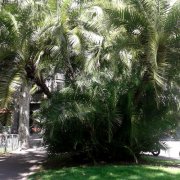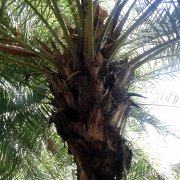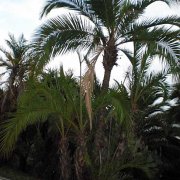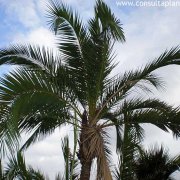Care of the palm tree Phoenix reclinata or Senegal date palm |
|
The genus Phoenix, family Arecaceae, comprises 11 species of palm trees native to tropical regions of Africa and Asia. Some species are: Phoenix reclinata, Phoenix canariensis, Phoenix theophrasti, Phoenix dactylifera, Phoenix roebelenii. Common names: Senegal date palm, Wild date palm. This species is native to Madagascar and tropical Africa. They are dioecious palm trees that produce numerous arched stems that reach 15 meters (49.2 feet) in height. They have long and elegant pinnate leaves 4 meters (13.12 feet) long with spiny petioles and dark green or yellowish leaflets. The flowers appear in long inflorescences of almost 1 meter (3.28 feet) in length. The fruits are edible but their taste is not pleasant. Young plants are used in large pots on terraces and in brightly lit interiors; the largest plants are used as isolated specimens in lawns or alongside streams and ponds. Phoenix reclinata can grow in full sun or semi-shade exposure. They resist occasional frosts. They are capable of growing in flooded soils; the soil can be a deep, moist garden substrate. Water frequently so that the substrate does not dry out completely. They resist flooding well. Fertilize in spring with a slow-release mineral fertilizer. Prune the dry leaves that are left hanging. They are resistant plants to the usual pests and diseases. They are propagated by cuttings from the lateral suckers or from seeds sown in a moist substrate formed by coarse sand and compost; they can germinate in 1 month. |
Images of the palm tree Phoenix reclinata or Senegal date palm |
Find plants
Phoenix reclinata or Senegal date palm | Care and Growing
© 2024 FavThemes





